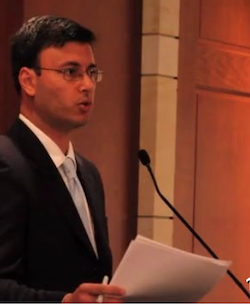 Health and Human Services Secretary Tom Price, M.D. today announced the selection of five entrepreneurial projects for investment by the Secretary’s Ventures Fund (HHS Ventures). The projects were chosen from across HHS and are part of the latest round of funding and support designed to advance the Department’s innovation agenda... HHS Ventures is a highly competitive effort that provides growth-stage funding and support to HHS employees with proven ideas for how to dramatically improve their office, agency, or the Department’s ability to carry out its mission...
Health and Human Services Secretary Tom Price, M.D. today announced the selection of five entrepreneurial projects for investment by the Secretary’s Ventures Fund (HHS Ventures). The projects were chosen from across HHS and are part of the latest round of funding and support designed to advance the Department’s innovation agenda... HHS Ventures is a highly competitive effort that provides growth-stage funding and support to HHS employees with proven ideas for how to dramatically improve their office, agency, or the Department’s ability to carry out its mission...US Department of Health and Human Services (HHS)
See the following -
The Need for Speed - It's Time to Act!
 As a society we also need to get moving on the population level as well - and the sooner the better! In his fascinating genomic epidemiology detective work Trevor Bedford conducted based on the COVID-19 research he and his team had done in the Bedford lab in Seattle WA, he concluded that the narrow testing that was done in the Seattle area in the early days of the Coronavirus spread allowed the virus to spread faster. In contrast, the Coronavirus testing-blitz in South Korea appears to keep the death rate lower than it could be. It's time to test! The FDA gave high-tech labs the green light to operate tests before receiving any agency review or authorization and both Quest Diagnostics and LabCorp already announced that they have test in the market. But according to CDC, as of March 8 there were only 1,707 tests performed in the US vs. 189,236 in South Korea.
As a society we also need to get moving on the population level as well - and the sooner the better! In his fascinating genomic epidemiology detective work Trevor Bedford conducted based on the COVID-19 research he and his team had done in the Bedford lab in Seattle WA, he concluded that the narrow testing that was done in the Seattle area in the early days of the Coronavirus spread allowed the virus to spread faster. In contrast, the Coronavirus testing-blitz in South Korea appears to keep the death rate lower than it could be. It's time to test! The FDA gave high-tech labs the green light to operate tests before receiving any agency review or authorization and both Quest Diagnostics and LabCorp already announced that they have test in the market. But according to CDC, as of March 8 there were only 1,707 tests performed in the US vs. 189,236 in South Korea.
- Login to post comments
The Pathway to Patient Data Ownership and Better Health
Digital health data are rapidly expanding to include patient-reported outcomes, patient-generated health data, and social determinants of health. Measurements collected in clinical settings are being supplemented by data collected in daily life, such as data derived from wearable sensors and smartphone apps, and access to other data, such as genomic data, is rapidly increasing. One projection suggests that a billion individuals will have their whole genome sequenced in the next several years. These additional sources of data, whether patient-generated, genomic, or other, are critical for a comprehensive picture of an individual’s health...
- Login to post comments
The Ransomware Attacks on Hospitals Are (Cyber) Criminal
 One of the redeeming aspects of crises is that, amidst all the confusion, suffering, and loss, there are usually moments of grace, of humans showing their best nature... Unfortunately, crises also tend to bring out the worst of our natures... And then there are the cyberattacks. Last week the federal Cybersecurity & Infrastructure Security Agency, the FBI, and HHS issued a joint alert Ransomware Activity Targeting the Healthcare and Public Health Sector, warning that they have "credible information of an increased and imminent cybercrime threat to U.S. hospitals and healthcare providers." I'll spare you the technical details of the expected attack strategies or suggested mitigation efforts, but I will note that they warned: "CISA, FBI, and HHS do not recommend paying ransom." Read More »
One of the redeeming aspects of crises is that, amidst all the confusion, suffering, and loss, there are usually moments of grace, of humans showing their best nature... Unfortunately, crises also tend to bring out the worst of our natures... And then there are the cyberattacks. Last week the federal Cybersecurity & Infrastructure Security Agency, the FBI, and HHS issued a joint alert Ransomware Activity Targeting the Healthcare and Public Health Sector, warning that they have "credible information of an increased and imminent cybercrime threat to U.S. hospitals and healthcare providers." I'll spare you the technical details of the expected attack strategies or suggested mitigation efforts, but I will note that they warned: "CISA, FBI, and HHS do not recommend paying ransom." Read More »
- Login to post comments
The Secretary’s Ventures Fund Announces 2017 Projects
 Health and Human Services Secretary Tom Price, M.D. today announced the selection of five entrepreneurial projects for investment by the Secretary’s Ventures Fund (HHS Ventures). The projects were chosen from across HHS and are part of the latest round of funding and support designed to advance the Department’s innovation agenda... HHS Ventures is a highly competitive effort that provides growth-stage funding and support to HHS employees with proven ideas for how to dramatically improve their office, agency, or the Department’s ability to carry out its mission...
Health and Human Services Secretary Tom Price, M.D. today announced the selection of five entrepreneurial projects for investment by the Secretary’s Ventures Fund (HHS Ventures). The projects were chosen from across HHS and are part of the latest round of funding and support designed to advance the Department’s innovation agenda... HHS Ventures is a highly competitive effort that provides growth-stage funding and support to HHS employees with proven ideas for how to dramatically improve their office, agency, or the Department’s ability to carry out its mission...- Login to post comments
The Shutdown Will Harm the Health and Safety of Americans, even After it's Long Over
 With the U.S. federal government shutdown now the longest in history, it's important to understand what a shutdown means for the health and safety of Americans. The good news is that in the short run, the consequences are relatively few. But, as a researcher who studies natural disaster planning, I believe that Americans should be worried about the federal government's long-term ability to ensure good public health and protect the public from disasters. As the shutdown drags on, it increasingly weakens the government's ability to protect Americans down the road, long after federal workers are allowed to go back to work. Many of these effects are largely invisible and may feel intangible because they don't currently affect specific individuals...
With the U.S. federal government shutdown now the longest in history, it's important to understand what a shutdown means for the health and safety of Americans. The good news is that in the short run, the consequences are relatively few. But, as a researcher who studies natural disaster planning, I believe that Americans should be worried about the federal government's long-term ability to ensure good public health and protect the public from disasters. As the shutdown drags on, it increasingly weakens the government's ability to protect Americans down the road, long after federal workers are allowed to go back to work. Many of these effects are largely invisible and may feel intangible because they don't currently affect specific individuals...
- Login to post comments
This mock pandemic killed 150 million people. Next time it might not be a drill
 A novel virus, moderately contagious and moderately lethal, has surfaced and is spreading rapidly around the globe. Outbreaks first appear in Frankfurt, Germany, and Caracas, Venezuela. The virus is transmitted person-to-person, primarily by coughing. There are no effective antivirals or vaccines...So began a recent day-long exercise hosted by the Johns Hopkins Center for Health Security. The simulation mixed details of past disasters with fictional elements to force government officials and experts to make the kinds of key decisions they could face in a real pandemic. It was a tense day. The exercise was inspired in part by the troubled response to the Ebola epidemic of 2014, and everyone involved was acutely aware of the very real and ongoing Ebola outbreak spreading in Congo.
A novel virus, moderately contagious and moderately lethal, has surfaced and is spreading rapidly around the globe. Outbreaks first appear in Frankfurt, Germany, and Caracas, Venezuela. The virus is transmitted person-to-person, primarily by coughing. There are no effective antivirals or vaccines...So began a recent day-long exercise hosted by the Johns Hopkins Center for Health Security. The simulation mixed details of past disasters with fictional elements to force government officials and experts to make the kinds of key decisions they could face in a real pandemic. It was a tense day. The exercise was inspired in part by the troubled response to the Ebola epidemic of 2014, and everyone involved was acutely aware of the very real and ongoing Ebola outbreak spreading in Congo.
- Login to post comments
U.S. Trying to Find More Doctors to Send to Disaster Areas
A U.S. government program that sends doctors and nurses to disaster zones says it needs more health-care workers, as relief efforts during this hurricane season are near the end of a second month with no end in sight in Puerto Rico and the U.S. Virgin Islands. The National Disaster Medical System, which recently wrapped up big deployments to hurricane-ravaged areas in Texas and Florida, says it will start recruiting more medical professionals in the next few weeks...
- Login to post comments
U.S., U.K. to collaborate on health IT, data projects
HHS and health authorities in the United Kingdom agreed to collaborate on a broad scope of health information technology and health data projects and practices. Read More »
- Login to post comments
Updated OIG 2015 work plan adds EHR issues under review
The Department of Health and Human Services Office of Inspector General continues to refine its scrutiny of electronic health records, adding a new focus area in an update to its work plan, but deleting several older items previously under review. The 2015 update says that for the first time, OIG will review the use of EHRs by accountable care organizations to coordinate care.
- Login to post comments
US and UK working to strengthen use of health IT for better patient care
As the use of health information technology (health IT) grows in both the United States and the United Kingdom, HHS Secretary Kathleen Sebelius and U.K. Secretary of State for Health Jeremy Hunt today signed a bi-lateral agreement for the use and sharing of health IT information and tools. The agreement strengthens efforts to cultivate and increase the use of health IT tools and information designed to help improve the quality and efficiency of the delivery of health care in both countries.
- Login to post comments
US Core Data for Interoperability Task Force Delivers its Recommendations
 On April 18, 2018 the HHS Health Information Technology Advisory Committee (HITAC) US Core Data for Interoperability Task Force delivered its recommendations on the draft US Core Data for Interoperability (USCDI) and Proposed Expansion Process which had been published for public comment back in January 2018. HITAC promptly accepted the Task Force’s recommendations. The Task Force focused almost exclusively on the process for identifying the USCDI rather than the proposed USCDI data itself. I especially appreciated their introduction of some key concepts related to how USCDI should be organized and understood.
On April 18, 2018 the HHS Health Information Technology Advisory Committee (HITAC) US Core Data for Interoperability Task Force delivered its recommendations on the draft US Core Data for Interoperability (USCDI) and Proposed Expansion Process which had been published for public comment back in January 2018. HITAC promptly accepted the Task Force’s recommendations. The Task Force focused almost exclusively on the process for identifying the USCDI rather than the proposed USCDI data itself. I especially appreciated their introduction of some key concepts related to how USCDI should be organized and understood.
- Login to post comments
Usability of Health IT Tools
 A recent article of mine celebrated a clever educational service offered on the Web by theUS Department of Health and Human Services. I ended with a list of three lessons for the health care field regarding usability of health IT Tools, which deserve further explanation. Communications can be improved by using the advanced features provided by the Web and mobile devices. In the HHS case, developers went to great lengths to provide a comfortable, pleasant experience to anyone who viewed their content, even if the viewers were visiting a different web site and the HHS content was merely embedded there.
A recent article of mine celebrated a clever educational service offered on the Web by theUS Department of Health and Human Services. I ended with a list of three lessons for the health care field regarding usability of health IT Tools, which deserve further explanation. Communications can be improved by using the advanced features provided by the Web and mobile devices. In the HHS case, developers went to great lengths to provide a comfortable, pleasant experience to anyone who viewed their content, even if the viewers were visiting a different web site and the HHS content was merely embedded there.
- Login to post comments
Using Open Technology To Build a Biodefense Against the Coronavirus
 As the number of US cases of the coronavirus rises, how will healthcare professionals be able to tell the difference between which panicked patients with similar symptoms has what? Even if the patient hasn't traveled to Wuhan or China recently, what if they sat at a Starbucks with someone who did? With the incubation time-lag before symptoms appear, who would even know? The challenge of monitoring 330 million people for infectious disease outbreaks is daunting. Take the flu as an example. During the last flu season which, as already discussed, was not as complex as this year's season, approximately 35.5 million Americans had flu symptoms, 16.5 million received medical care, 490,600 were hospitalized and 34,200 died.
As the number of US cases of the coronavirus rises, how will healthcare professionals be able to tell the difference between which panicked patients with similar symptoms has what? Even if the patient hasn't traveled to Wuhan or China recently, what if they sat at a Starbucks with someone who did? With the incubation time-lag before symptoms appear, who would even know? The challenge of monitoring 330 million people for infectious disease outbreaks is daunting. Take the flu as an example. During the last flu season which, as already discussed, was not as complex as this year's season, approximately 35.5 million Americans had flu symptoms, 16.5 million received medical care, 490,600 were hospitalized and 34,200 died.
- Login to post comments
VA's Hurricane Relief Efforts Extend Beyond Veterans
 The American Legion met with VA leadership on Sept. 29 to learn what humanitarian aid VA is, and has been, providing to hurricane victims in Puerto Rico, the U.S. Virgin Islands, Florida and Texas..."There are 60 civilian hospitals in Puerto Rico, many of which are still inoperative, don't have power or have serious damage. There's only one hospital that is like the beacon in Puerto Rico and that is the VA medical center - seeing people, taking care of everybody we can and feeding everybody we can."..."We did a lot of preparing and started sending stuff down there before the hurricane. Now we're using these resources to take care of non-veterans and civilians until the hospitals - that are either damaged, incapable of operating or we don't know the condition of - come back into the system and then we'll transfer them. It is certainly necessary for a humanitarian effort like this," Loren said...
The American Legion met with VA leadership on Sept. 29 to learn what humanitarian aid VA is, and has been, providing to hurricane victims in Puerto Rico, the U.S. Virgin Islands, Florida and Texas..."There are 60 civilian hospitals in Puerto Rico, many of which are still inoperative, don't have power or have serious damage. There's only one hospital that is like the beacon in Puerto Rico and that is the VA medical center - seeing people, taking care of everybody we can and feeding everybody we can."..."We did a lot of preparing and started sending stuff down there before the hurricane. Now we're using these resources to take care of non-veterans and civilians until the hospitals - that are either damaged, incapable of operating or we don't know the condition of - come back into the system and then we'll transfer them. It is certainly necessary for a humanitarian effort like this," Loren said...
- Login to post comments
Will Trump Administration Back Rules Treating Health Insurance as a Utility, Not Luxury?
On June 14, 2016 a Federal Court ruled that broadband internet is as essential to American as phones, electricity, water and sewer systems and should be available to all Americans as a utility, rather than a luxury that doesn’t need close government supervision. In the United States, public utilities are often natural monopolies because the infrastructure required producing and delivering a product such as electricity or water is very expensive to build and maintain. As a result, they are often government monopolies, or if privately owned, the sectors are specially regulated by a public utilities commission which severely limits the profits for the private utility company and the associated costs passed on to consumers of that utility...
- Login to post comments